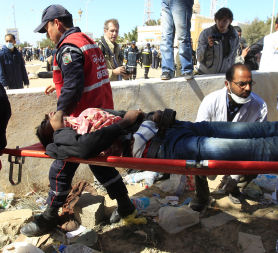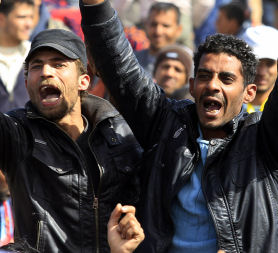Libya-Tunisia border: guards fire into air to control crowds
Shots have been fired into the air at the border of Libya and Tunisia. Channel 4 News Chief Correspondent Alex Thomson says around 20,000 people are waiting at the border.

Tunisian border guards have fired into the air to try to control a crowd of people clamouring to get through a border crossing to escape the violence in Libya.
Border guards were letting people, mostly foreigners who had been working in Libya, through the crossing at Ras Jdir but could not process them through immigration fast enough to keep up with the numbers arriving.
The crowd was pressed up against a concrete wall dividing the no man’s land between the Libyan and Tunisian border posts.
At intervals, Tunisian border guards would open a blue metal gate to let a small group through.
But some people were throwing their bags over the wall and trying to climb over, prompting border guards first to hit them with sticks and then to fire repeatedly into the air.
“When are we going to be taken out of here? We cannot accept this.” Egyptian worker
“It looks like it’s going to get worse…They are going to break down the wall in the end,” said Ayman Gharaibeh, an officer with the UNHCR, the United Nations refugee agency.
“We are trying to get the assistance of the other (Libyan) side to ease the pressure on the wall.”
Channel 4 News Chief Correspondent Alex Thomson is at the Libya-Tunisia border:
Around the border area I guess at least 20,000 people are spread around, some under desert trees playing cards, some inside small compounds made from their bulging packing cases.
Others join the long queues to Tunisian volunteers doling out bread, dates, water and fruit juice.
Up the road the Tunisian army and the UNHCR - the UN refugee body - has set up tents in the desert scrub for these people to await transportation.
Read more: The Tunisia border - not catastrophic, not comfortable.

Tens of thousands of people, mostly migrant workers, have fled Libya since an uprising against the four-decade rule of Muammar Gaddafi led to a violent crackdown by his security forces.
There were chaotic scenes too on the Tunisian side of the border. Thousands of Egyptian refugees, who had made it across from Libya, asked angrily why their government was not arranging to have them repatriated.
“When are we going to be taken out of here? We cannot accept this,” said one Egyptian at a tent camp about 5 km (3 miles) from the border. “Give me a camel. I will take a camel. I just want to go home.”
Read more: Arab Revolt - the Middle East uprising
Many of the refugees stranded at the border do not have the money to pay for their passage home. Some have been sleeping out in the open for several days in cold and wet conditions.
There had been reports that the Egyptian authorities were sending two ships to a nearby port to take them home but there was no sign of them on Tuesday.
The UNHCR extended its camp near the border overnight, erecting tents with a capacity to accommodate 10,000 people. The organisation was preparing to put in more tents to increase the camp’s capacity to 20,000.
“Water and sanitation is a major issue, toilets are our next big headache.” Hovig Etyemezian, UNHCR
“There is growing tension,” said Hovig Etyemezian, Senior Protection Officer with the UNHCR. “But they (Tunisian border authorities) have not lost control yet.”
“Water and sanitation is a major issue, toilets are our next big headache,” Etyemezian said at the camp, where 500 white tents went up overnight, each big enough for 10 people.
A Tunisian army colonel said his forces were managing the flow of refugees through the border, but needed foreign governments to do more to transport their citizens home.
“We need the most rapid possible evacuation,” said Colonel Mohamed Essoussi. “The major weaknesses are in transport, in air and maritime transport.”